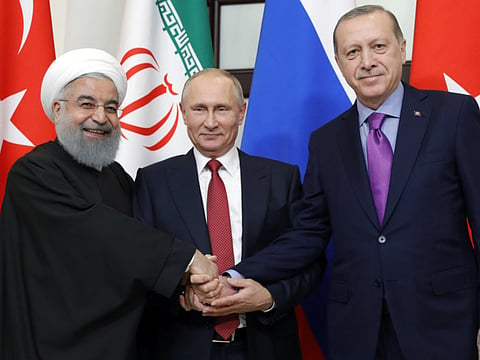Why Tehran summit failed to ease Idlib tensions
Russia and Iran differed with Turkey on several major issues around the upcoming offensive, leading to an impasse and collapse of talks

The three-way summit that concluded in Tehran recently has failed, rather dramatically, raising fears on what might be in store for the region in the weeks to come as Russian President Vladimir Putin and Iranian President Hassan Rouhani part ways, albeit temporarily, with their Turkish counterpart, Recep Tayyip Erdogan.
The three leaders, self-billed as “guarantors” of the Astana Process, were supposed to arrive at an agreement over Idlib, a war-ridden city in the Syrian northwest, controlled by the Turkish-backed armed opposition since mid-2015. Erdogan has had his eyes trained on the city for years, having wanted to incorporate it into a “safe zone” that was carved out by his army on the borders with Syria, which included the cities of Jarablus, Azaz, Al Bab and more recently, Afrin, lying west of the Euphrates River, deep within Russia’s sphere of influence. The Turkish president hoped to use these cities to relocate more than one million Syrian refugees based in his country and to prevent Kurdish militias and Daesh from advancing towards the Syrian-Turkish border. The Russians initially did not mind his territorial ambitions, looking the other way as his army overran Syrian territory in the summer of 2016. In exchange, he did not lift a finger to save his Syrian proxies in East Ghouta, which was recaptured by the Syrian and Russian armies last April.
That understanding collapsed, however, when it came to Idlib, where 12 Turkish military stations have been based since late 2017. Erdogan refused to dismantle them and was seemingly adamant on saving an estimated 70,000 members of the armed Syrian opposition in Idlib, all on Turkish payroll, wanting Putin and Rouhani to allow them — rather than the Syrian Army — to purge the city from Hayat Tahrir Al Sham (HTS), formerly known as Jabhat Al Nusra, and Daesh. Those Turkish proxies included military groups such as Ahrar Al Sham, Suqoor Al Sham, the Free Syrian Army, and the Free Idlib Army, broadly looped into a new coalition known as the National Liberation Front. Damascus and Moscow see them as no different from HTS and Daesh — so long as they refuse to surrender their arms and join the Russian-led reconciliation process.
The Erdogan Proposal
Hours before the summit, Erdogan floated the idea of “postponing” the assault on Idlib, saying that it would result in a mass exodus of more refugees into Turkey, which already hosts more than two million of them, saying that it can take in no more. He suggested that the Russian and Syrian forces re-take Jisr Al Shughour instead, which is part of the Idlib governorate, held by rebels since mid-2015, overlooking the Syrian coast where Russia’s military base stands at Hmeimeem. Erdogan proposed opening humanitarian corridors into regime-held areas, to spare the 1.5 million civilians of Idlib, saying that he would finish off all the terrorists left behind. The Turks were also willing to accept the return of Syrian officialdom to Idlib, through police stations, schools, hospitals and the raising of the Syrian flag. The Turkish-backed militants would then get pardoned, in reward for their role in the war on terror, and be given the choice of either returning to civil life, or joining the Syrian army, like what had happened in Dara’a in the Syrian south.
Putin and Rouhani flatly rejected the proposal, having hoped that Erdogan would accept their military strategy, given his deteriorating relations with the United States. Hoping to appease him, they had even suggested relocating the extremists from Idlib to the borders of Kurdish-held cities in the Syrian northeast, making them a problem for the Kurds. Hours after the summit concluded, a full-fledge operation started on southern Idlib, striking at all militants, both those mandated by the Turks as well as those in the ranks of Daesh and HTS. The Russians hope to conclude it before the US midterm elections in November, fearing that if the US president faces an uphill battle for control of the Senate and the House of Representatives, he may use Idlib to distract attention from his failures at home, which may lead to his eventual impeachment — if his many foes in the administration get their way. US President Donald Trump has threatened to strike at Syria — yet again — if chemical weapons are used in Idlib, prompting the Russians to order a naval build-up in the Mediterranean, in case the US president puts his words into action.
Future action
There may still be room for a breakthrough, however, as Turkish, Russian and Iranian intelligence officials are in touch, despite the dead-end reached by the three leaders. An unexpected development occurred hours after the summit concluded, when 18 Syrian soldiers were killed by a Kurdish ambush in Al Qamishly, giving the Russians and Iranians plenty of reason to keep talking to Erdogan. Earlier this summer, fearing an eventual US walkout on Syria, the Kurds had entered into serious talks with Moscow and Damascus, proposing that they join the fight for Idlib and relinquish control of Al Hassakeh and Al Raqqa to the Syrian Army, in exchange for the return of basic services to the Kurdish areas. After what happened in Al Qamishly recently, those talks are now over, which is music to the ears of Erdgoan. He is still very serious on eradicating the Kurdish threat and if Damascus and Moscow lend a hand, he may change his mind on Idlib. We are not there yet, though.
Sign up for the Daily Briefing
Get the latest news and updates straight to your inbox


